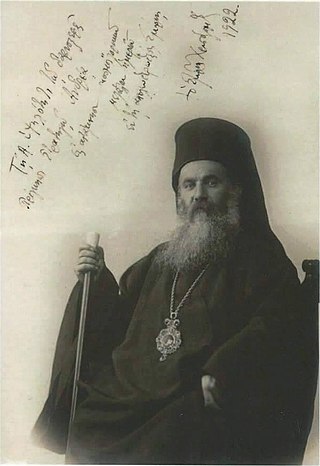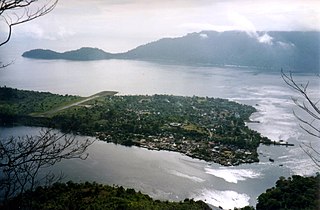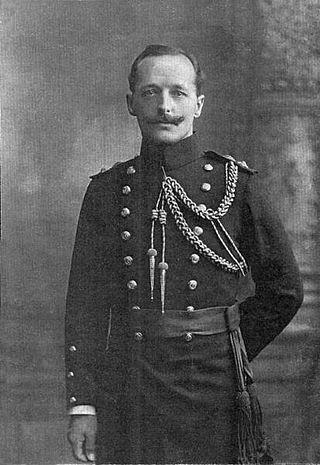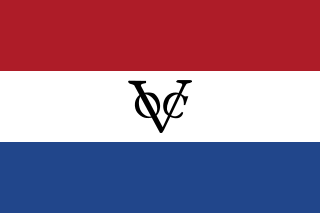
The Banda Islands are a volcanic group of ten small volcanic islands in the Banda Sea, about 140 km (87 mi) south of Seram Island and about 2,000 km (1,243 mi) east of Java, and constitute an administrative district (kecamatan) within the Central Maluku Regency in the Indonesian province of Maluku. The islands rise out of 4-to-6-kilometre deep ocean and have a total land area of approximately 172 square kilometres (66 sq mi). They had a population of 18,544 at the 2010 Census and 20,924 at the 2020 Census. Until the mid-19th century the Banda Islands were the world's only source of the spices nutmeg and mace, produced from the nutmeg tree. The islands are also popular destinations for scuba diving and snorkeling. The main town and administrative centre is Banda Neira, located on the island of the same name.
Marxism–Leninism is a communist ideology that became the largest faction of the communist movement in the world in the years following the October Revolution. It was the predominant ideology of most socialist governments throughout the 20th century. Developed in Russia by the Bolsheviks, it was the state ideology of the Soviet Union, Soviet satellite states in the Eastern Bloc, and various countries in the Non-Aligned Movement and Third World during the Cold War, as well as the Communist International after Bolshevisation.

Captain Sir Mansfield George Smith-Cumming was a British naval officer who served as the first chief of the Secret Intelligence Service (SIS).

Lenin's Mausoleum, also known as Lenin's Tomb, is a mausoleum located at Red Square in Moscow, Russia. It serves as the resting place of Soviet leader Vladimir Lenin, whose preserved body has been on public display since shortly after his death in 1924, with rare exceptions in wartime. The outdoor tribune over the mausoleum's entrance was used by Soviet leaders to observe military parades. The structure, designed by Alexey Shchusev, incorporates some elements from ancient mausoleums such as the Step Pyramid, the Tomb of Cyrus the Great and, to some degree, the Temple of the Inscriptions.

Major-General Sir Colin McVean Gubbins, was the prime mover of the Special Operations Executive (SOE) in the Second World War.
Dmitri Antonovich Volkogonov was a Soviet and Russian historian and colonel general who was head of the Soviet military's psychological warfare department. After research in secret Soviet archives, he published a biography of Joseph Stalin and Vladimir Lenin, among others such as Leon Trotsky. Despite being a committed Stalinist and Marxist–Leninist ideologue for most of his career, Volkogonov came to repudiate communism and the Soviet system within the last decade of his life before his death from cancer in 1995.

Aniseed balls are a comfit type of hard round sweet sold in the UK, Ireland, Malta, South Africa, Canada, New Zealand, and Australia. They are shiny and dark reddish brown, and hard like Gobstoppers, but generally only 1⁄2 inch (13 mm) across.

Chrysostomos Kalafatis, also known as Saint Chrysostomos of Smyrna, Chrysostomos of Smyrna and Metropolitan Chrysostom, was the Greek Orthodox metropolitan bishop of Smyrna (İzmir) between 1910 and 1914, and again from 1919 until his death in 1922. He was born in Triglia in the then Ottoman Empire in 1867. He aided the Greek campaign in Smyrna in 1919 and was subsequently killed by a lynch mob after Turkish troops occupied the city at the end of the Greco-Turkish War of 1919–1922. He was declared a martyr and a saint of the Eastern Orthodox Church by the Holy Synod of the Church of Greece on 4 November 1992.

The burning of Smyrna destroyed much of the port city of Smyrna in September 1922. Eyewitness reports state that the fire began on 13 September 1922 and lasted until it was largely extinguished on 22 September. It began four days after the Turkish military captured the city on 9 September, effectively ending the Greco-Turkish War, more than three years after the landing of Greek army troops at Smyrna on 15 May 1919. Estimated Greek and Armenian deaths resulting from the fire range from 10,000 to 125,000.
Nathaniel Courthope was an English East India Company officer involved in the wars with the Dutch over the spice trade.

Banda Neira is an island in the Banda Islands, Indonesia. It is administered as part of the administrative Banda Islands District within the Central Maluku Regency in the province of Maluku. To the south is the main town of the same name, which is the largest town in the archipelago with around 7,000 inhabitants.
Joan Bright Astley, OBE, born Penelope Joan McKerrow Bright, was a British intelligence officer and organizer during World War II. She organized the Special Information Centre (SIC) for Winston Churchill during World War II. As a young woman, she dated Ian Fleming and is believed to be one of the three or four women whose attributes were used by him for the character of Miss Moneypenny.
Ministry of Defence 1 (MD1), also known as "Churchill's Toyshop", was a British weapon research and development organisation of the Second World War.

Major-General Sir Wilfrid Malleson was a major-general in the British Indian Army who led a mission to Turkestan during the Russian Civil War.

The Fall of Berlin is a 1950 Soviet war and propaganda film, in two parts separated in the manner of a serial. It was produced by Mosfilm Studio and directed by Mikheil Chiaureli, with a script written by Pyotr Pavlenko and a musical score composed by Dmitri Shostakovich. Portraying the history of the Second World War with a focus on a highly positive depiction of the role Soviet dictator Joseph Stalin played in the events, it is considered one of the most important manifestations of Stalin's cult of personality, and a noted example of Soviet realism. After De-Stalinization, the film was banned in the Eastern Bloc for several decades.

António de Abreu was a 16th-century Portuguese navigator and naval officer. He participated under the command of Afonso de Albuquerque in the conquest of Ormus in 1507 and Malacca in 1511, where he got injured. Departing from Malacca in November 1511 with four ships, in an exploratory voyage to the 'Spice Islands' of Maluku, he led the first European expedition to reach Timor and the Banda Islands, in Indonesia, in 1512.

Ambon was a governorate of the Dutch East India Company, consisting of Ambon Island and ten neighbouring islands. Steven van der Hagen captured Fort Victoria on 22 February 1605 from the Portuguese in the name of the Dutch East India Company. Until 1619, Ambon served as the capital of the Dutch possessions in East Asia. In that year Batavia was founded to function as the staple port for the Dutch East India Company in Asia. The island was the world center of clove production until the 19th century. The Dutch prohibited the rearing of the clove-tree in all the other islands subject to their rule, in order to secure the monopoly to Ambon.

The history of Soviet Russia and the Soviet Union (USSR) reflects a period of change for both Russia and the world. Though the terms "Soviet Russia" and "Soviet Union" often are synonymous in everyday speech, when referring to the foundations of the Soviet Union, "Soviet Russia" often specifically refers to brief period between the October Revolution of 1917 and the creation of the Soviet Union in 1922.

The Premier of the Soviet Union was the head of government of the Union of Soviet Socialist Republics (USSR). Twelve individuals held the post. Among the most known are Vladimir Lenin and Joseph Stalin.

Wolfram Wette is a German military historian and peace researcher. He is an author or editor of over 40 books on the history of Nazi Germany, including the seminal Germany and the Second World War series from the German Military History Research Office (MGFA).















